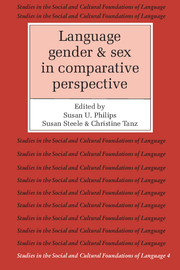Book contents
- Frontmatter
- Contents
- Acknowledgments
- List of contributors
- Introduction: The interaction of social and biological processes in women's and men's speech
- Part I Women's and men's speech in cross-cultural perspective
- Part II Gender differences in the language of children
- Part III Sex differences in language and the brain
- Introduction
- 10 Cerebral organization and sex: interesting but complex
- 11 Sex differences in the patterns of scalp-recorded electrophysiological activity in infancy: possible implications for language development
- References
- Index
Introduction
Published online by Cambridge University Press: 05 June 2012
- Frontmatter
- Contents
- Acknowledgments
- List of contributors
- Introduction: The interaction of social and biological processes in women's and men's speech
- Part I Women's and men's speech in cross-cultural perspective
- Part II Gender differences in the language of children
- Part III Sex differences in language and the brain
- Introduction
- 10 Cerebral organization and sex: interesting but complex
- 11 Sex differences in the patterns of scalp-recorded electrophysiological activity in infancy: possible implications for language development
- References
- Index
Summary
The chapters in Part III address the question of whether there are any differences between males and females in cerebral organization and neurological maturation that have linguistic effects. The question has two subparts: First, are there any biologically based differences in brain organization or maturation that can be correlated absolutely or partially with sex? And, second, if such differences exist, what consequences, if any, are there for cognition in general and language in particular?
The volatility of the topic must be admitted at the outset. Scientific research is presumably objective, but it is difficult to ensure that research into this particular topic is value-free. The study of the implications of biologically based sex differences raises the specter of genetic determinism, of using the results of scientific inquiry to substantiate cultural prejudices and biases. I admit the presence of the specter; I believe that anyone working in this area must face squarely the possible political ramifications of his or her work. Having laid my political cards on the table, I do not intend to play out the hand. I focus only on the scientific aspects of this investigation.
Investigation of the correlation between sex and brain organization or maturation has a long history, spanning two millennia. Men and women have been perceived, through the ages, as different on physical, emotional, and intellectual grounds – essentially with respect to every parameter. The issue, then, has been how to account for such differences.
- Type
- Chapter
- Information
- Language, Gender, and Sex in Comparative Perspective , pp. 263 - 267Publisher: Cambridge University PressPrint publication year: 1987



